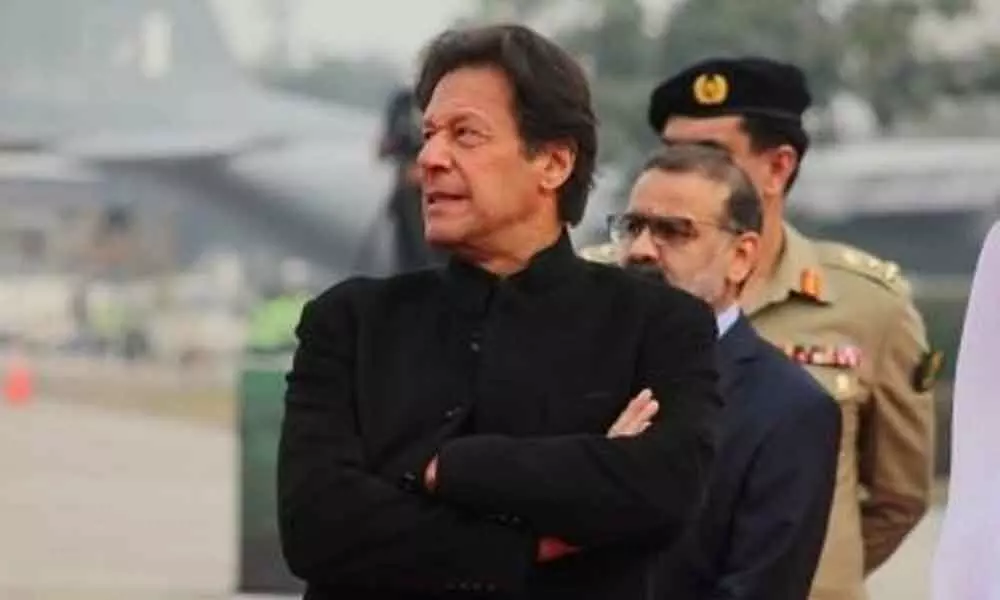Hollow claims to a responsible state

Pakistan Prime Minister Imran Khan
Pakistan Prime Minister Imran Khan on January 14 unveiled the public version of what is claimed to be 'the first ever' codified National Security Policy (NSP) of Pakistan, defining the direction the country should take in the next few years.
Pakistan Prime Minister Imran Khan on January 14 unveiled the public version of what is claimed to be 'the first ever' codified National Security Policy (NSP) of Pakistan, defining the direction the country should take in the next few years. It was projected as the outcome of a full civil-military consensus, culmination of the untiring work of the officials of the National Security Division over the 'past seven years' and 'a proud moment' for all Pakistanis.
Khan spoke of the dire need of a 'multi-prong strategy,' pointing out that the country had since its inception focused on military security because of 'an insecure environment' created for it by 'a neighbour that is seven times bigger,' and tries to make out that Pakistan would now work for economic security, strong presence of the 'rule of law' and regional peace.
The open part of the document is no doubt rhetorical in content – replete with platitudes like 'pushing national cohesion through an inclusive national discourse,' 'prioritising equitable economic development' and 'reintroducing regional connectivity to realign the country's foreign policy.' It clearly contends, however, that India is the principal adversary of Pakistan and ventures into an explicit criticism of the Indian regime under Prime Minister Narendra Modi for allegedly pursuing 'divisive policies. Projecting India as the main threat, it contends that prospects of violent conflict with it have grown because of a 'regressive and dangerous ideology which is gripping the collective consciousness in the immediate neighbourhood.'
Three clear readings can be made from what the Pak Prime Minister said in the presence of the top brass of his country's military establishment, and these would add to the security concerns of India.
First is the uninhibited 'communalisation' of Indo-Pak relations by Imran Khan who has for some time been vocal about the issue of 'minority rights' in India under the BJP regime. The second is the total absence of any criticism of extremists and radicals operating out of the territory of Pakistan with faith-based motivation. And lastly, the policy document carries an imprint of Sino-Pak strategic alliance that has given a new geopolitical profile to Pakistan.
Keeping up its belligerent posture towards India, Pakistan alleged that the 'rise in Hindutva-driven politics in India is deeply concerning and impacting Pakistan's immediate security. References to the seven years of study that went into the framing of NSP shows that Pakistan is targeting the rule of Prime Minister Modi in this context. In short, Pakistan maintained that normalising ties with India will have Kashmir at its core.
Anti-India lobbies have been active on these lines within India and abroad, but it is unprecedented that Khan has openly framed Indo-Pak relationship in Hindu-Muslim terms. This is an enlargement of the Pak stand of regarding Kashmir as a 'Muslim' issue. The security policy refers to 'our diverse cultural heritage' in terms of accepting various segments of Islamic spectrum – from 'revivalism' of Islamic radicals who subscribed to Emirate to Islamism of the advocates of a Republic run on the concept of 'sovereignty of Allah.' This is why Pakistan has never faulted the militant outfits of Islamic extremists and radicals and reserved its condemnation of 'terrorism' only to raise an allegation that it is India that is behind the domestic turbulence in Pakistan.
Within the Muslim world, Pakistan remained a source of strength for the block led by Saudi Arabia but is now for some time getting identified with an emerging group including Turkey and Malaysia that does not hesitate to criticise the US and as a conscious policy showed willingness to adjust with Islamic radicals for whom the US-led West was the prime enemy.
Recent developments in Afghanistan add to India's concern on threat from Islamic terrorists. The call of Jehad given by Taliban, Al Qaeda and ISIS for political reasons, to 'bring back the lost glory of Islam' consequently had many takers too. The democratic world needs to have an effective strategy to handle this rising threat to its security.
Finally, there is a foreign policy shift in Pakistan broadly corresponding to the emergence of Sino-Pak strategic alliance cemented by the CPEC that provided an upper hand to China in this axis and a gradual drift of US-Pakistan relations in a direction where Pakistan was able to show recalcitrance toward American line on many vital issues like terrorism, Afghan Emirate and Kashmir.
Pakistan is evidently banking heavily on its alliance with China in securing its own geopolitical importance for the world, having its sway in Afghanistan for maintaining its 'strategic depth' there after entering into a 'give and take' with China in regard to any apprehension that China might have of an outside interference with China's doings in Xinjiang and achieving an equilibrium with both China and Russia over the situation in Afghanistan.
The National Security Policy announced by Khan with such fanfare is meant to create the impression that Pakistan is devoting to internal economic growth and better domestic governance – its real aim is to project the line that a much graver threat to Pakistan's security is posed by India under Prime Minister Modi. India has to suitably take this into account in dealing with the Sino-Pak axis that is now becoming very active against this country.
(The writer is a former Director of Intelligence Bureau)








